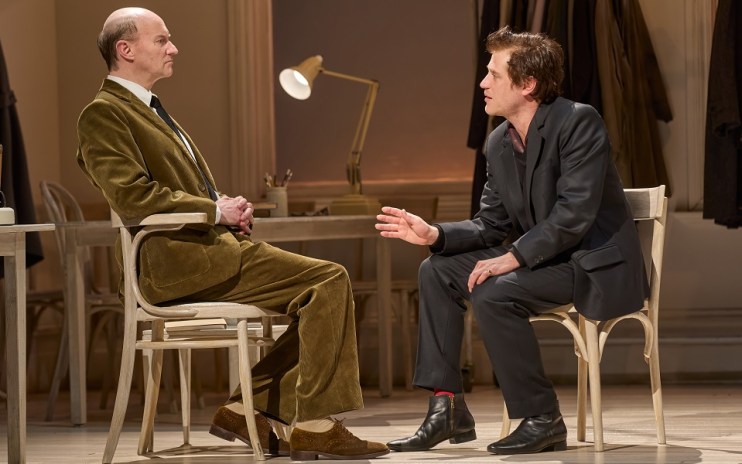The Motive and The Cue, National Theatre, review: Mark Gatiss is the best bit

The Motive and The Cue review and star rating: ★★★
If the London theatre scene has an A-List, a good chunk of that list compromises the cast and crew of The Motive and The Cue. Written by Harry Potter & The Cursed Child’s Jack Thorne, directed by the titan that is Sam Mendes, and starring indie pin-up Johnny Flynn alongside Mark Gatiss, this new piece of writing is made even starrier by its subject matter, the fraught relationship between Sir John Gielgud and Richard Burton during rehearsals for a prolific 1960s version of Hamlet. It’s got some tremendous performances, but like those Hamlet rehearsals half a century ago, it doesn’t all come together.
Gatiss, of course, is superb as Gielgud, ends up stealing the show, and is well worth the cost of a ticket alone. He spins Thorne’s catty Gielgud lines with an addictive waspishness; it’s the sort of studied performance that could only come from Gatiss, who will have no doubt spent years studying queer theatre legends like Gielgud. Flynn, too, is superb. He puts on an impressively thick, nasal Burton-esque Welsh accent that drifts close to caricature at times, but is commanding; as entertaining and charismatic as you’d assume Burton was when on his best behaviour and as curt and vile as when he was at his drunken worst.
There’s just not a whole load of reasons to return after the interval. What The Motive and The Cue needs is a set up as sharp as these men’s minds. But it’s all interesting enough: both men and the creative gulfs between them are given space to be explored through touching scenes which feel historically accurate, with drinking and ageing being two key themes. We see Burton and Gielgud argue over the “contradictions” of directorship, and the myriad ways in which an actor can try to advance themselves by leaving the big screen to take on Hamlet, arguably the most challenging role an actor can play. Both Gielgud and Burton famously played successful Hamlets; the production that inspired this play is now studied as one of the most significant in the latter half of last century.
But it all feels a little meek. We see these Golden Age icons be frothy at parties and sharp-tongued in the rehearsal room, and in particular Gatiss is poignant as the ageing, self-doubting Gielgud, but there’s not a whole load more to stick around for, nor many pertinent questions being asked. Tuppence Middleton has great chemistry with Flynn, looking like she wishes to be permanently glued to Burton’s crotch, but she doesn’t get enough time to properly explore Elizabeth Taylor or the intricacies of her fraught relationship with Burton beyond the odd throwaway line.
The staging of the final scene, in which Burton steps out to perform his Hamlet for the first time in a role that would go on to define him, is majestic and will be remembered for decades. But overall The Motive and The Cue gets a little too carried away with celebrating the characters of these two men, without delving into detail enough to find a story to keep us in our seats. I dare say it feels a tad self-interested, which feels awkwardly ironic given how the overarching idea is how Burton’s ego affected his work.
The Motive and The Cue plays at the National Theatre until 15 July
